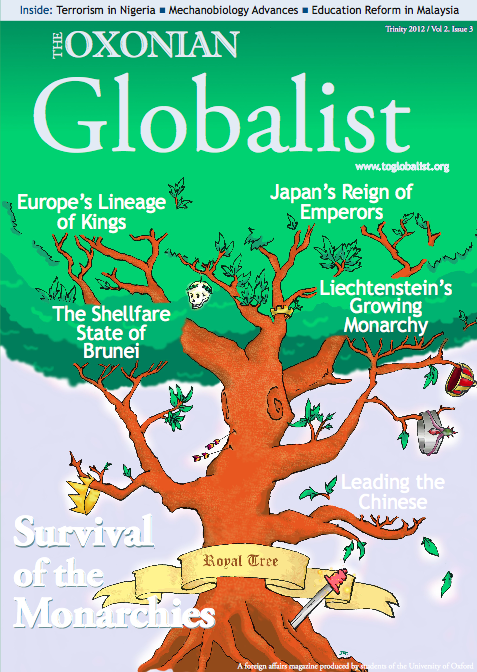
War as destruction: a British soldier stands in the ruins of a French town during World War I. Photo by National Library of Scotland via Flickr.
In 1997 Martin Amis wrote in the New York Times that the end of the Cold War was likely to inaugurate “uninteresting times”. I myself have heard this assertion on a number of occasions from peers and elders alike. It suggests we have passed into a period of historical stasis without precedent. Of course, there are problems with this analysis. Who can say with any confidence that world history has come to any sort of “end”? Further, how has the world’s present condition led people to even consider such an absurd claim as legitimate?
A major dilemma facing modern societies is not that we are lacking in historical events, but that we often feel remote from them. Television and the Internet confront us with a constant stream of information that conflates the significant with the mundane, giving the unsteady course of history the appearance of a spectator sport, commonly euphemised as “current events”.
One cannot avoid the omnipresence of war in human history. War and the preparation for it has often been the basis for extremely influential changes in social organisation. The Napoleonic Wars for instance, pushed millions of conscripts across the plains of Europe to foreign lands where they suddenly found themselves in a position to decide the fate of their homeland in small ways that became significant on a wide scale. War provided an opportunity to find one’s place in History, to join the quests for national and personal self-realisation.
In observing the Napoleonic Wars, Carl von Clausewitz remarked that when states permitted themselves to engage in scorched earth campaigns, they risked exposing themselves to total destruction by a retaliating enemy. For violence to be “productive” it had to be contained. This concept can be traced in the changing status of war throughout the twentieth century.
The changing status of war
While we can debate whether or not atomic bombs alone brought an end to the Second World War, we can be sure that they were responsible for starting the next one. Nevertheless, this war would be as unprecedented as the weapons released above Hiroshima and Nagasaki.
In 1948, American President Harry S. Truman gathered his advisers to discuss the moral and political implications of atomic weaponry. “We have got to treat this differently from rifles and cannon and ordinary things like that”, he said, asking that his advisers recognise that the ruins of Hiroshima and Nagasaki could someday be those of any American city.
Meanwhile, a concerned Stalin had ordered the creation of a Soviet bomb. Although he displayed a disturbingly cavalier attitude in interviews, Stalin secretly worried the Russian people would chase him from power if he involved the Soviet Union in another conflict, adding that atomic weapons “can hardly be used without spelling the end of the world”. He knew that the atomic bomb was practically unusable.
Even after Truman’s departure from office and Stalin’s death, neither side lost sight of the possibility of mutual destruction. The closest they would come to attacking one another would be during the Cuban Missile Crisis of 1962. It forced all involved to acknowledge the apocalyptic consequences of war between the United States and the Soviet Union. The conflict was thus named the Cold War, for both sides would never meet in direct combat. Instead they relied on the creation of spheres of influence from which they engaged one another in psychological warfare and proxy conflicts.
By the time the threat of nuclear annihilation began to disappear from the public consciousness in the years following the fall of the Soviet Union, wars had a completely different character. America’s war in Vietnam was fought primarily by soldiers who belonged to working class or minority backgrounds. Although the involvement of the upper classes wars had always been more “comfortable” in comparison to that of their less fortunate compatriots, it was becoming clear that their place would have even less to do with leading at the front and more with the tricky, often bureaucratic business of slaughter management.
War as slaughter management
Did war become invisible? Not exactly – you could now watch it on television. Yet on-screen violence, protected from critical evaluation by that devious alliance of plastic and distance, has a way of becoming as dull and innocuous as the pale blue light that carries it.
This gradual disappearance and sterilisation of violence was not without its detractors. There were those who claimed to stand for action, progress, and revolution. While many hoped to achieve these peacefully, others did not. Enter the terrorist. Mao Zedong once argued that there are only two kinds of death, that which is light as a feather and that which is as heavy as a mountain; only by dying for a people or a cause could death, and thus life, have any meaning.
It was with this same conviction that terrorist groups sprung to action. The terrorist opposes himself to what he perceives as the conformity and complacency of the mainstream. An eternal chameleon, he imbibes the angst of his age, its ideas, its methods, its technologies, only to turn them against each other. He lives by a messianic creed, believing that an end to history lies just over the horizon, that his violence will be absolved by God’s love or the advent of a utopian future.
The idea that we are living in uninteresting times is a dangerous one, for it equates historical significance with violent conflict. It neglects peaceful struggles for economic, gender, and racial equality as well as the never-ending – probably doomed – quest for psychological fulfillment on a mass and individual scale. The struggle for peace is without end, and it is for that reason that we will always be living in “interesting” or significant times. Boredom is surrender.



